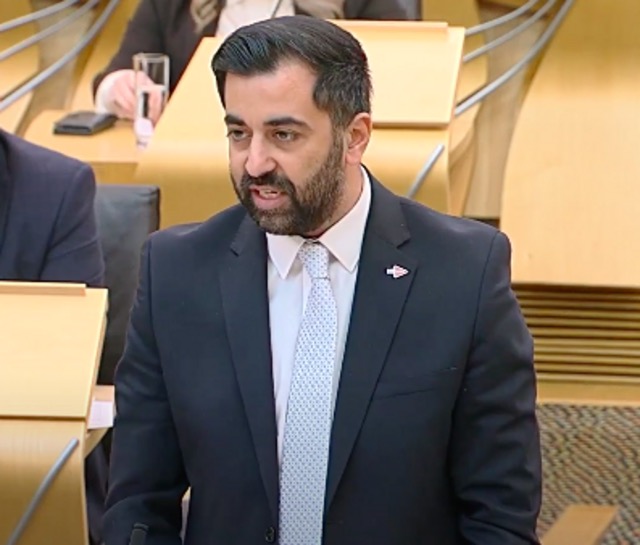A political storm is engulfing Westminster after former Scottish First Minister Humza Yousaf publicly condemned Prime Minister Keir Starmer for his recent immigration remarks, branding them “dog whistle politics.” Starmer’s controversial warning that Britain “risks becoming an island of strangers” if migration isn’t curbed has drawn ire from across the political spectrum, sparking accusations of racial insensitivity and electoral opportunism.
The clash between Yousaf and Starmer underscores a deepening divide in UK politics over how immigration should be discussed—and who gets to shape that conversation.
Starmer’s ‘Island of Strangers’ Speech
Keir Starmer’s speech earlier this week was intended to roll out Labour’s tougher stance on immigration ahead of the upcoming general election. In it, he pledged to cut net migration by tightening visa rules, raising language requirements, and slowing the path to British citizenship.
But what captured headlines—and drew outrage—was his statement that without change, the UK risked becoming an “island of strangers.” Critics immediately seized on the phrase, calling it inflammatory, divisive, and reminiscent of hard-right rhetoric from decades past.
While Starmer claimed he was speaking for ordinary Britons concerned about cultural cohesion, many saw his language as a political misstep that alienates migrant communities and panders to nationalist voters.
Humza Yousaf’s Fierce Response
Humza Yousaf didn’t mince words in his rebuke. The former SNP leader called the remarks “deeply irresponsible” and accused Starmer of “dog whistle politics” designed to appeal to right-wing sentiment. Speaking to The Standard, Yousaf warned that such rhetoric risked “handing the keys of No 10 to Nigel Farage,” suggesting that Labour’s shift to the right could empower the very populists it claims to oppose.
Yousaf, the UK’s first Muslim first minister, emphasized that language matters in national debates on identity and belonging. “We should be building bridges, not turning communities against one another with coded language that sows suspicion,” he said.
Rhetorical Echoes of Enoch Powell?
Starmer’s phrase “island of strangers” has drawn uncomfortable comparisons to Enoch Powell’s infamous 1968 “Rivers of Blood” speech, which warned of a Britain where citizens would become “strangers in their own country.”
Though Starmer insisted his comments were about unity, critics argue that invoking such imagery—even implicitly—risks reviving the cultural anxiety narratives long used to marginalize immigrant communities.
Several Labour MPs and community leaders have spoken out, warning that the party must not trade moral integrity for political expediency.
Fallout Within Labour and Minority Communities
The backlash isn’t limited to the SNP or opposition figures. Within Labour itself, some MPs—particularly those from minority backgrounds—are reportedly dismayed by the direction of the party’s rhetoric.
Community leaders and advocacy groups have also raised concerns. “We’ve come to expect better from Labour,” said one spokesperson from the Muslim Council of Britain. “Framing migrants as a threat to British identity is not only misleading, it’s dangerous.”
This internal tension could present a challenge for Starmer as he tries to present Labour as both tough on immigration and committed to diversity and inclusion.
Political Calculations and Electoral Risks
Analysts believe Starmer’s tough stance on immigration is part of a calculated effort to win over centrist and right-leaning voters disillusioned with the Conservatives. However, this strategy carries risks.
By alienating minority voters and progressives—core parts of Labour’s base—Starmer may find himself eroding trust within the very coalitions he needs to win power. The party’s handling of this controversy will likely shape public perception in the months leading up to the election.
SNP and Devolution Divide on Immigration
Yousaf’s condemnation also reflects broader tensions between the devolved Scottish government and Westminster over immigration policy. The SNP has long argued for a separate immigration system tailored to Scotland’s demographic needs, with a more welcoming stance towards migrants.
Starmer’s centralised approach not only clashes with this vision but could deepen the constitutional debate over devolution and autonomy.
Conclusion
Keir Starmer’s remarks about the UK becoming an “island of strangers” have ignited a fierce debate about the language of immigration, the future of Labour’s identity, and the broader direction of British politics. Humza Yousaf’s intervention highlights the growing divide between inclusive, community-focused narratives and politically expedient messaging.
As Labour seeks to navigate this controversy, the challenge will be to articulate policies that address legitimate concerns about migration—without sacrificing compassion, dignity, or unity.
FAQs
Q1: What exactly did Keir Starmer say about immigration?
A1: He warned that the UK could become an “island of strangers” if immigration levels aren’t brought down and integration isn’t prioritized.
Q2: Why is Humza Yousaf criticizing Starmer?
A2: Yousaf accused Starmer of using “dog whistle politics” to appeal to anti-immigration sentiment and warned it could damage community cohesion.
Q3: What does ‘dog whistle politics’ mean?
A3: It refers to coded language that seems neutral but is designed to signal controversial or divisive messages to specific audiences.
Q4: Has Labour faced backlash from within?
A4: Yes. Several MPs and community leaders have criticized the rhetoric as harmful and at odds with Labour’s traditional values.
Q5: Could this impact Labour’s election prospects?
A5: Potentially. It may help win over centrists, but risks alienating progressives and ethnic minority voters who form a key part of Labour’s base.



